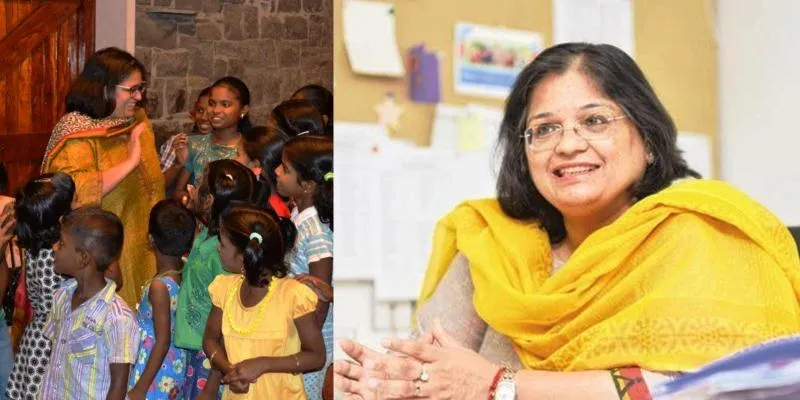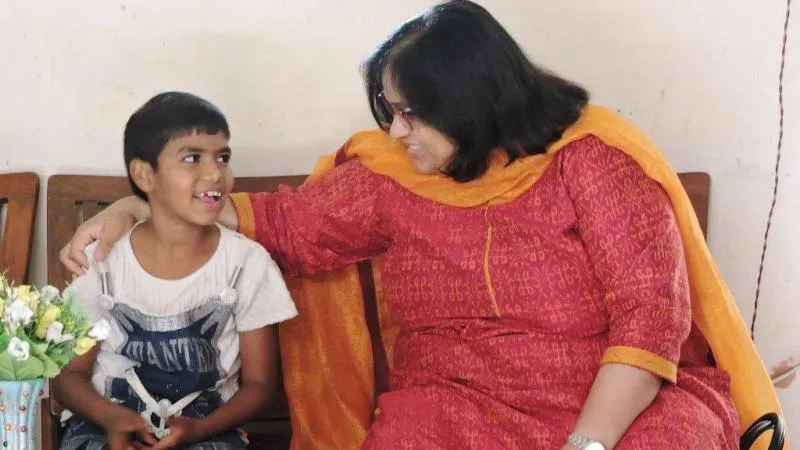This CA turned social worker is empowering women and children across 22 states
As the Secretary General of SOS Children’s Villages, Anuja Bansal is spreading love and care to over 30,000 children.

Decades ago, when Anuja Bansal completed her studies in Chartered Accountancy, she wanted to climb the corporate ladder and make it big. But destiny had some other plans. Soon after practising for a year, Anuja was introduced to an NGO by a friend. The influence of its work was strong enough to change Anuja’s mind; she committed herself to the cause of social development of women and children. Today she has no regrets. Having worked for many organisations since then, Anuja has made significant contribution to the social cause.
Anuja says she wanted to work for the development of women and children in the society in order to significantly contribute in nation building. “One can bring sustainable social change in the society only by investing in children and women. It is important to make investment in their development process. Children shape the future. But not all are taken care of. And if we invest in women, then we are not just investing in a single individual but in the entire family. And children will be the direct beneficiary. If these two are not taken care of, the nation cannot achieve the growth trajectory it aims to achieve,” she says.
At present, Anuja is heading SOS Children’s Villages of India as its Secretary General. She is spearheading the organisation’s two flagship programmes — Family Based Care (FBC) and Family Strengthening Programme (FSP).
Prior to this, she has worked as Director Operations at Oxfam India; CFO of Bharti Foundation, Programme Support Head-Access Development Services; and Finance Head-CRY Child Rights and You. At a time when greater accountability and transparency is demanded of the NGO sector, her expertise and work in the areas of strategic planning, building strong governance and compliance systems, and sound financial management, has helped strengthen SOS India’s organisational credibility.

Providing care for women and children
With the aim to continuously bring down the number of parentless and abandoned children, the organisation has adopted group foster care model through Family Based Care (FBC) programme. It is a remedial programme, which reaches out to around 7,000 once parentless or abandoned children in 32 SOS Children's Villages across India. Each children's village has 12-15 family homes. Each home on an average has 10 children along with an SOS mother. This programme involves all round development including physical and emotional wellbeing, providing education, nutrition, health and psychological development of children to help them become responsible citizen of the society.
The organisation is also working on a family strengthening programme, where the communities and the families work together to empower the mother to take proper care of her children. Family Strengthening Programme is a preventive community intervention programme which covers over 17,000 children across India. It is designed to prevent children from losing parental care. It runs in slums and rural areas. The beneficiaries of this programme are children of the most vulnerable section, including those of widows, single women, and below poverty line (BPL) families. It functions with the help of local partners and communities and it attempts to assist and empower parents in taking care of children. In the process it strengthens not only the families, but also creates a vibrant network within the community that lasts much longer.
With presence across 22 states, the organisation through these programmes is spreading love and care to over 30,000 children. It is also running over 10 educational and vocational centres, which are providing quality education to over 7,000 children and young people.
“We were privileged enough to have support of our families and access to many things when we were growing up. But there are thousands of children, who are not that privileged for no fault of theirs. It is just because of the circumstances. It becomes our responsibility to take care of them,” says Anuja.
While many social development organisations are working to address the need of providing shelter, healthcare, nutrition and education to children, SOS also works to provide emotional support to children. Most child care institutions take care of children till they turn 18 years. But at SOS, children are provided support beyond that age. “The child at 18 is not ready enough to be thrown out to the world. At SOS Children’s Villages, we take care of young people till much later.” After completing the school, children take up vocational or professional courses. The organisation continues to support them and also helps them prepare for jobs. And most of these children are able to get a well-paying job after the completion of the programme.
Addressing the challenges
Anuja has big dreams to change the lives of abandoned children in India. She says there are estimated 20 million such children in the country. “If I could make a difference in the lives of at least half of them, then I would feel I have achieved my dream.” While the impact of the work can be scaled up, it cannot be done overnight and certainly not by one organisation, she asserts.
Unavailability of the financial resources is the biggest challenge. Anuja says much larger number of children can be covered if the investment is doubled. Another challenge she says is creating awareness among people about the needs of children and how citizens can help in addressing them. “Another constrain is to build partnership with like-minded people, who are working for similar cause including the government. We can partner with the government to build capacity of the child care institutions it runs. This partnership can help us reach out to many more children,” she says.
Anuja adds that the government has been taking NGOs and other social development organisations on board, while framing policies or developing the implementation plans. “In the last few years a lot of effort has been made to work along with the government, be it through JJ Act or providing care to children, but a lot more needs to be done. It is equally important to work with the state government to ensure children’s rights become part of state guidelines as well.
SOS Children's Villages of India has been recently awarded the best organisation for breakthrough innovations in sustainability and corporate social responsibility (CSR), as part of All India Management Association 7th Innovation Practitioner's Summit. The award recognised SOS India for adopting a unique approach towards social development practices and impacting communities.
Earlier, the organisation used to receive its majority of funding through international sources. But now 70 percent of the funding comes from within India. There are also a lot of individual donors as well who sponsor children. Anuja says the Companies Act has made a big difference.







